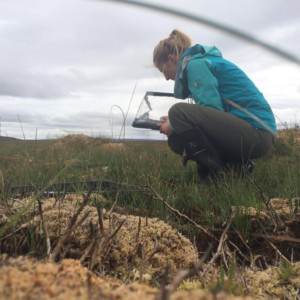
Katy Ross
UK Centre for Ecology & Hydrology
Project
Sheep versus sea-lions? Quantifying human impacts on the carbon and greenhouse gas balance of peatlands in the Falkland Islands.
Supervisors
- Prof Chris Evans, UK Centre for Ecology and Hydrology Bangor
- Prof Sue Page, University of Leicester
- Dr Ross Morrison, UK Centre for Ecology and Hydrology
- Dr Arnoud Boom, University of Leicester
- Dr Stefanie Carter, South Atlantic Environment Research Institute
- Dr Anne D. Jungblut, Natural History Museum
PhD Summary
The Falkland Islands are just over half the size of Wales but they contain around 10% of the peatland found in the UK and its overseas territories, however, very little is known about the condition of this peat. This PhD aims to quantify the greenhouse gas emissions of Falkland’s peat and the impact the past 250 years of human settlement has had. This PhD will also explore how human land-use has impacted the peatland carbon stock through microbial and geochemical analysis, all of which will be used to gain a greater understanding of the drivers of carbon and greenhouse gas fluxes in the Falklands.
Previous activity
| What did you do before your PhD?
My first degree was in Conservation Biology and Ecology at the University of Exeter’s Cornwall campus alongside which I carried out a number of voluntary roles across different conservation sectors. However one of the standout opportunities was spending the summer with the Royal Society for the Protection of Birds (RSPB) in Northern Scotland on Europe’s largest blanket bog. I had previously volunteered on peatlands with the North Pennines AONB but this was the first opportunity I had to carry out extensive fieldwork, restoration and research into this incredible ecosystem. Since then I’ve been fascinated with all things peat. I completed my degree with a dissertation looking into the impacts of fire and forestry on blanket bog species composition although graduating in a pandemic meant there weren’t that many peaty jobs around! However, I was fortunate enough to be taken on by Devon County Council as an Assistant Ecologist (after a brief spell working as Sociological Research Assistant) where I worked until the start of this PhD. I’ve always been interested in ecology and have tried to make time for volunteering with woodlands, wetlands, grasslands and protected species, and now it’s a privilege to be researching them. |
Why did you choose doctoral research?
I had known for a long time that I wanted to work on peatlands and while I love the practical side of conservation I’m increasingly realising how important it is to understand an ecosystem to be able to effectively conserve it. Before taking on this PhD position I was struggling to decide whether to pursue a career in research or project roles in peatland conservation but I think by completing this PhD I’ll gain a really in-depth understanding of peatland functioning. I’m also realising how useful the skills gained from a PhD could be in the future such as being able to develop monitoring and restoration systems for degraded peatlands, and being able to manage and interpret the data from these projects more effectively. I was also looking to find a position where I could really challenge myself, to expand my knowledge and answer previously unanswered questions.
Why did you choose CENTA?
I was particularly interested in CENTA because of the interdisciplinary nature of the studentships they support. While some studentships allow you to go into incredible detail to understand a topic I found that CENTA studentships support you to use techniques from across scientific disciplines to gain a better understanding of the system as a whole. CENTA’s huge number of incredible partners has meant that I’m not only working with research groups in different disciplines but also with groups across the UK and internationally. I believe that because of CENTA’s set up I will finish this PhD with a greater breadth of understanding and an enhanced ability to work with unfamiliar topics with many project partners.
Future plans
Prior to this PhD I had not considered a career in academia however I’ve been really inspired by those working in active research around me and I hope throughout this PhD I can explore careers in research further. I’m also keen to keep the work I am doing relevant and useful to those who would benefit from my research. Therefore, at the conclusion of this PhD I’d be interested in opportunities that allow me to translate science into policy or coordinate research programmes for conservation organisations. Although I’ve only recently started this PhD I’m already beginning to realise how many unique and essential skills I will develop over the next few years from project management and grant writing to coordinating international partners and just ‘doing science’.
